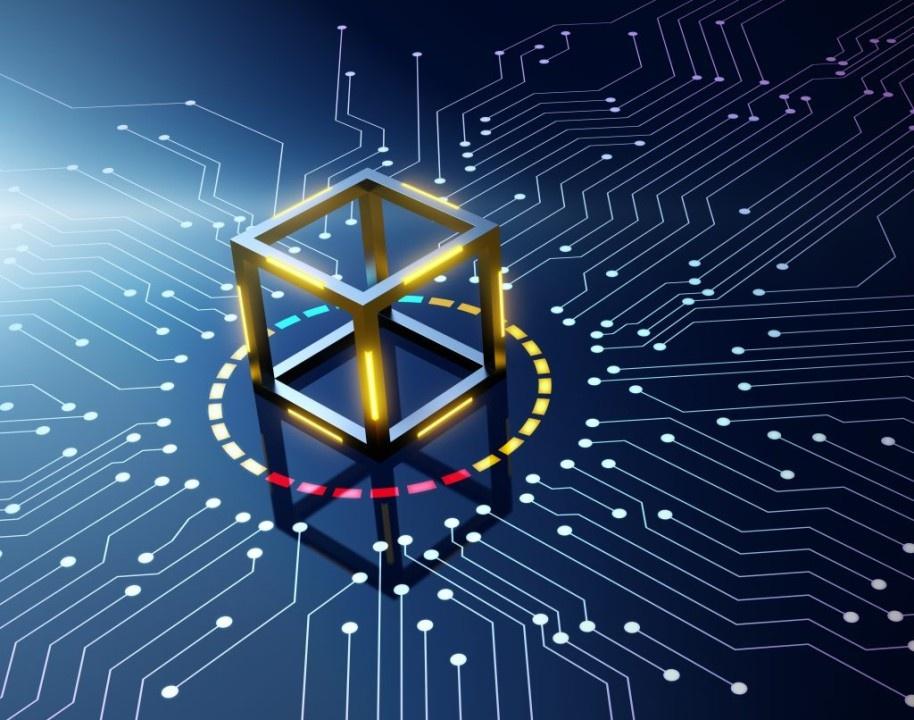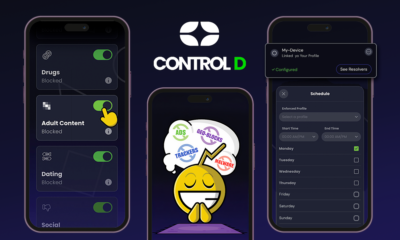TECHNOLOGY
9 Trends That Will Dominate Blockchain Technology In 2023

Blockchain technology is set to revolutionize the operations and processes of many industries including governmental agencies.
The adoption of blockchain requires time and efforts, in addition it will stimulate people to acquire new skills, and traditional businesses will have to completely reconsider their processes to harvest the maximum benefits from using this promising technology.
The following 9 trends will dominate blockchain technology in 2023:

1. Blockchain 4.0
Blockchain 4.0 is focused on innovation. Speed, user experience and usability by larger and common mass will be the key focus areas for blockchain 4.0. We can divide Blockchain 4.0 applications into two verticals:
• Web 3.0
• Metaverse
Web 3.0
The 2008 global financial crisis exposed the cracks in centralized control, paving the way for decentralization. The world needs Web 3.0- a user-sovereign platform. Because Web 3.0 aims to create an autonomous, open, and intelligent internet, it will rely on decentralized protocols, which blockchain can provide.
There are already some third-generation blockchains that are designed to support web 3.0, but with the rise of Blockchain 4.0, we can expect the emergence of more web 3.0 focused blockchains that will feature cohesive interoperability, automation through smart contracts, seamless integration, and censorship-resistant storage of P2P data files.
Metaverse
The dream projects of tech giants like Facebook, Microsoft, Nvidia, and many more, Metaverses, are the next big thing for us to experience in the coming few years. We are connected to virtual worlds across different touchpoints like social engagement, gaming, working, networking and many more. Metaverse will make these experiences more vivid and natural.
Advanced AI, IoT, AR & VR, Cloud computing and Blockchain technologies will come into play to create the virtual-reality spaces of metaverse , where users will interact with a computer-generated environment and other users through realistic experiences.
Centralized Metaverse entails more intense user engagements, deeper use of internet services and more uncovering of users’ personal data. All these almost likely means higher cybercrime exposure. Giving power to centralized bodies to regulate, control and distribute users’ data is not a sustainable set-up for the future of Metaverse. Therefore, much emphasis has been placed on developing decentralized Metaverse platforms that will provide user autonomy. Decentraland, Axie Infinity, and Starl, these are all decentralized Metaverses powered by Blockchain:
Also, Blockchain 4.0’s advanced solutions can help Metaverse users regulate their security and trust needs. Take the Metaverse gaming platform, for example, where users may purchase, possess, and trade in-game items with potentially enormous value. Proof of ownership through something as immutable and scarce as NFTs will be required to prevent forgery of these assets.
At the end blockchain 4.0 will enable businesses to move some or all of their current operations onto secure, self-recording applications based on decentralized, trustless, and encrypted ledgers. Businesses and institutions can easily enjoy the basic benefits of the blockchain.
2. Stablecoins Will Be More Visible
Using Bitcoin as an example of cryptocurrencies is highly volatile in nature. To avoid that volatility, stablecoins came to the picture strongly with stable value associated with each coin. As of now, stablecoins are in their initial phase and it is predicted that 2023 will be the year when blockchain stablecoins will achieve their all-time high.
3. Social Networking Problems Meet Blockchain Solution
There are around 4.74 billion social media users around the globe in 2022.
The introduction of blockchain in social media will be able to solve the problems related to notorious scandals, privacy violations, data control, and content relevance. Therefore, the blockchain blend in the social media domain is another emerging technology trend in 2023.
With the implementation of blockchain, it can be ensured that all the social media published data remain untraceable and cannot be duplicated, even after its deletion. Moreover, users will get to store data more securely and maintain their ownership. Blockchain also ensures that the power of content relevance lies in the hands of those who created it, instead of the platform owners. This makes the user feel more secure as they can control what they want to see. One daunting task is to convince social media platforms to implement it, this can be on a voluntary basis or as a result of privacy laws similar to GDPR.
4. Interoperability and Blockchain Networks
Blockchain interoperability is the ability to share data and other information across multiple blockchain systems as well as networks. This function makes it simple for the public to see and access the data across different blockchain networks. For example, you can send your data from one Ethereum blockchain to another specific blockchain network. Interoperability is a challenge but the benefits are vast.
5. Economy and Finance Will Lead Blockchain Applications
Unlike other traditional businesses, the banking and finance industries don’t need to introduce radical transformation to their processes for adopting blockchain technology. After it was successfully applied for the cryptocurrency, financial institutions began seriously considering blockchain adoption for traditional banking operations.
Blockchain technology will allow banks to reduce excessive bureaucracy, conduct faster transactions at lower costs, and improve its secrecy. One of the blockchain predictions made by Gartner is that the banking industry will derive billions of dollars of business value from the use of blockchain-based cryptocurrencies by 2023.
Moreover, blockchain can be used for launching new cryptocurrencies that will be regulated or influenced by monetary policy. In this way, banks want to reduce the competitive advantage of standalone cryptocurrencies and achieve greater control over their monetary policy.
6. Blockchain Integration into Government Agencies
The idea of the distributed ledger is also very attractive to government authorities that have to administrate very large quantities of data. Currently, each agency has its separate database, so they have to constantly require information about residents from each other. However, the implementation of blockchain technologies for effective data management will improve the functioning of such agencies.
According to Gartner, by 2023, more than a billion people will have some data about them stored on a blockchain, but they may not be aware of it. Also, national cryptocurrencies will appear, it’s inevitable that governments will have to recognize the benefits of blockchain-derived currencies. Digital money is the future and nothing will stop.
7. Blockchain Combines with IoT
The IoT tech market will see a renewed focus on security as complex safety challenges crop up. These complexities stem from the diverse and distributed nature of the technology. The number of Internet-connected devices has breached the 26 billion mark. Device and IoT network hacking will become commonplace in 2023. It is up to network operators to stop intruders from doing their business.
The current centralized architecture of IoT is one of the main reasons for the vulnerability of IoT networks. With billions of devices connected and more to be added, IoT is a big target for cyber-attacks, which makes security extremely important.
Blockchain offers new hope for IoT security for several reasons. First, blockchain is public, everyone participating in the network of nodes of the blockchain network can see the blocks and the transactions stored and approve them, although users can still have private keys to control transactions. Second, blockchain is decentralized, so there is no single authority that can approve the transactions eliminating Single Point of Failure (SPOF) weakness. Third and most importantly, it’s secure—the database can only be extended and previous records cannot be changed.
8. Blockchain with AI
With the integration of AI (Artificial Intelligence) with blockchain technology will make for a better development. This integration will show a level of improvement in blockchain technology with an adequate number of applications.
The International Data Corporation (IDC) suggests that global spending on AI will reach $57.6 billion by 2023 and 51% of businesses will be making the transition to AI with blockchain integration.
Additionally, blockchain can also make AI more coherent and understandable, and we can trace and determine why decisions are made in machine learning. Blockchain and its ledger can record all data and variables that go through a decision made under machine learning.
Moreover, AI can boost blockchain efficiency far better than humans, or even standard computing can. A look at the way in which blockchains are currently run-on standard computers proves this with a lot of processing power needed to perform even basic tasks
Examples of applications of AI in Blockchain: Smart Computing Power, Creating Diverse Data Sets, Data Protection, Data Monetization, Trusting AI Decision Making.

9. Demand for Blockchain Experts
Blockchain is a new technology and there are only few percent of individuals who are skilled in this technology. As blockchain technology becomes a fast-increasing and wide-spreading technology, that creates a situation for many to develop skills and experience about blockchain technology.
Even though the number of experts in blockchain fields is increasing, on the other hand the implementation of this technology has a rapid growth which will create a situation for the demand of Blockchain experts by 2023.
It’s worth saying that there are genuine efforts by universities and colleges to catch up with this need including San Jose State University with several courses covering blockchain technology, but the rate of graduating students with enough skills to deal with blockchain technology is not enough to fill the gap. Also, Companies are taking steps to build on their existing talents by adding training programs for developing and managing blockchain networks.
Source link
TECHNOLOGY
Next-gen chips, Amazon Q, and speedy S3

AWS re:Invent, which has been taking place from November 27 and runs to December 1, has had its usual plethora of announcements: a total of 21 at time of print.
Perhaps not surprisingly, given the huge potential impact of generative AI – ChatGPT officially turns one year old today – a lot of focus has been on the AI side for AWS’ announcements, including a major partnership inked with NVIDIA across infrastructure, software, and services.
Yet there has been plenty more announced at the Las Vegas jamboree besides. Here, CloudTech rounds up the best of the rest:
Next-generation chips
This was the other major AI-focused announcement at re:Invent: the launch of two new chips, AWS Graviton4 and AWS Trainium2, for training and running AI and machine learning (ML) models, among other customer workloads. Graviton4 shapes up against its predecessor with 30% better compute performance, 50% more cores and 75% more memory bandwidth, while Trainium2 delivers up to four times faster training than before and will be able to be deployed in EC2 UltraClusters of up to 100,000 chips.
The EC2 UltraClusters are designed to ‘deliver the highest performance, most energy efficient AI model training infrastructure in the cloud’, as AWS puts it. With it, customers will be able to train large language models in ‘a fraction of the time’, as well as double energy efficiency.
As ever, AWS offers customers who are already utilising these tools. Databricks, Epic and SAP are among the companies cited as using the new AWS-designed chips.
Zero-ETL integrations
AWS announced new Amazon Aurora PostgreSQL, Amazon DynamoDB, and Amazon Relational Database Services (Amazon RDS) for MySQL integrations with Amazon Redshift, AWS’ cloud data warehouse. The zero-ETL integrations – eliminating the need to build ETL (extract, transform, load) data pipelines – make it easier to connect and analyse transactional data across various relational and non-relational databases in Amazon Redshift.
A simple example of how zero-ETL functions can be seen is in a hypothetical company which stores transactional data – time of transaction, items bought, where the transaction occurred – in a relational database, but use another analytics tool to analyse data in a non-relational database. To connect it all up, companies would previously have to construct ETL data pipelines which are a time and money sink.
The latest integrations “build on AWS’s zero-ETL foundation… so customers can quickly and easily connect all of their data, no matter where it lives,” the company said.
Amazon S3 Express One Zone
AWS announced the general availability of Amazon S3 Express One Zone, a new storage class purpose-built for customers’ most frequently-accessed data. Data access speed is up to 10 times faster and request costs up to 50% lower than standard S3. Companies can also opt to collocate their Amazon S3 Express One Zone data in the same availability zone as their compute resources.
Companies and partners who are using Amazon S3 Express One Zone include ChaosSearch, Cloudera, and Pinterest.
Amazon Q
A new product, and an interesting pivot, again with generative AI at its core. Amazon Q was announced as a ‘new type of generative AI-powered assistant’ which can be tailored to a customer’s business. “Customers can get fast, relevant answers to pressing questions, generate content, and take actions – all informed by a customer’s information repositories, code, and enterprise systems,” AWS added. The service also can assist companies building on AWS, as well as companies using AWS applications for business intelligence, contact centres, and supply chain management.
Customers cited as early adopters include Accenture, BMW and Wunderkind.
Want to learn more about cybersecurity and the cloud from industry leaders? Check out Cyber Security & Cloud Expo taking place in Amsterdam, California, and London. Explore other upcoming enterprise technology events and webinars powered by TechForge here.
TECHNOLOGY
HCLTech and Cisco create collaborative hybrid workplaces

Digital comms specialist Cisco and global tech firm HCLTech have teamed up to launch Meeting-Rooms-as-a-Service (MRaaS).
Available on a subscription model, this solution modernises legacy meeting rooms and enables users to join meetings from any meeting solution provider using Webex devices.
The MRaaS solution helps enterprises simplify the design, implementation and maintenance of integrated meeting rooms, enabling seamless collaboration for their globally distributed hybrid workforces.
Rakshit Ghura, senior VP and Global head of digital workplace services, HCLTech, said: “MRaaS combines our consulting and managed services expertise with Cisco’s proficiency in Webex devices to change the way employees conceptualise, organise and interact in a collaborative environment for a modern hybrid work model.
“The common vision of our partnership is to elevate the collaboration experience at work and drive productivity through modern meeting rooms.”
Alexandra Zagury, VP of partner managed and as-a-Service Sales at Cisco, said: “Our partnership with HCLTech helps our clients transform their offices through cost-effective managed services that support the ongoing evolution of workspaces.
“As we reimagine the modern office, we are making it easier to support collaboration and productivity among workers, whether they are in the office or elsewhere.”
Cisco’s Webex collaboration devices harness the power of artificial intelligence to offer intuitive, seamless collaboration experiences, enabling meeting rooms with smart features such as meeting zones, intelligent people framing, optimised attendee audio and background noise removal, among others.
Want to learn more about cybersecurity and the cloud from industry leaders? Check out Cyber Security & Cloud Expo taking place in Amsterdam, California, and London. Explore other upcoming enterprise technology events and webinars powered by TechForge here.
TECHNOLOGY
Canonical releases low-touch private cloud MicroCloud

Canonical has announced the general availability of MicroCloud, a low-touch, open source cloud solution. MicroCloud is part of Canonical’s growing cloud infrastructure portfolio.
It is purpose-built for scalable clusters and edge deployments for all types of enterprises. It is designed with simplicity, security and automation in mind, minimising the time and effort to both deploy and maintain it. Conveniently, enterprise support for MicroCloud is offered as part of Canonical’s Ubuntu Pro subscription, with several support tiers available, and priced per node.
MicroClouds are optimised for repeatable and reliable remote deployments. A single command initiates the orchestration and clustering of various components with minimal involvement by the user, resulting in a fully functional cloud within minutes. This simplified deployment process significantly reduces the barrier to entry, putting a production-grade cloud at everyone’s fingertips.
Juan Manuel Ventura, head of architectures & technologies at Spindox, said: “Cloud computing is not only about technology, it’s the beating heart of any modern industrial transformation, driving agility and innovation. Our mission is to provide our customers with the most effective ways to innovate and bring value; having a complexity-free cloud infrastructure is one important piece of that puzzle. With MicroCloud, the focus shifts away from struggling with cloud operations to solving real business challenges” says
In addition to seamless deployment, MicroCloud prioritises security and ease of maintenance. All MicroCloud components are built with strict confinement for increased security, with over-the-air transactional updates that preserve data and roll back on errors automatically. Upgrades to newer versions are handled automatically and without downtime, with the mechanisms to hold or schedule them as needed.
With this approach, MicroCloud caters to both on-premise clouds but also edge deployments at remote locations, allowing organisations to use the same infrastructure primitives and services wherever they are needed. It is suitable for business-in-branch office locations or industrial use inside a factory, as well as distributed locations where the focus is on replicability and unattended operations.
Cedric Gegout, VP of product at Canonical, said: “As data becomes more distributed, the infrastructure has to follow. Cloud computing is now distributed, spanning across data centres, far and near edge computing appliances. MicroCloud is our answer to that.
“By packaging known infrastructure primitives in a portable and unattended way, we are delivering a simpler, more prescriptive cloud experience that makes zero-ops a reality for many Industries.“
MicroCloud’s lightweight architecture makes it usable on both commodity and high-end hardware, with several ways to further reduce its footprint depending on your workload needs. In addition to the standard Ubuntu Server or Desktop, MicroClouds can be run on Ubuntu Core – a lightweight OS optimised for the edge. With Ubuntu Core, MicroClouds are a perfect solution for far-edge locations with limited computing capabilities. Users can choose to run their workloads using Kubernetes or via system containers. System containers based on LXD behave similarly to traditional VMs but consume fewer resources while providing bare-metal performance.
Coupled with Canonical’s Ubuntu Pro + Support subscription, MicroCloud users can benefit from an enterprise-grade open source cloud solution that is fully supported and with better economics. An Ubuntu Pro subscription offers security maintenance for the broadest collection of open-source software available from a single vendor today. It covers over 30k packages with a consistent security maintenance commitment, and additional features such as kernel livepatch, systems management at scale, certified compliance and hardening profiles enabling easy adoption for enterprises. With per-node pricing and no hidden fees, customers can rest assured that their environment is secure and supported without the expensive price tag typically associated with cloud solutions.
Want to learn more about cybersecurity and the cloud from industry leaders? Check out Cyber Security & Cloud Expo taking place in Amsterdam, California, and London. Explore other upcoming enterprise technology events and webinars powered by TechForge here.
-

 PPC6 days ago
PPC6 days ago19 Best SEO Tools in 2024 (For Every Use Case)
-

 MARKETING7 days ago
MARKETING7 days agoEcommerce evolution: Blurring the lines between B2B and B2C
-
SEARCHENGINES5 days ago
Daily Search Forum Recap: April 19, 2024
-
SEARCHENGINES6 days ago
Daily Search Forum Recap: April 18, 2024
-

 WORDPRESS6 days ago
WORDPRESS6 days agoHow to Make $5000 of Passive Income Every Month in WordPress
-

 SEO7 days ago
SEO7 days ago2024 WordPress Vulnerability Report Shows Errors Sites Keep Making
-

 WORDPRESS6 days ago
WORDPRESS6 days ago10 Amazing WordPress Design Resouces – WordPress.com News
-

 SEO6 days ago
SEO6 days ago25 WordPress Alternatives Best For SEO
















You must be logged in to post a comment Login